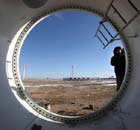Money
Central Huijin to raise funds from bond issue
By Wang Bo and Mao Lijun (China Daily)
Updated: 2010-04-21 09:01
 |
Large Medium Small |
BEIJING - Central Huijin Investment Co, the domestic investment arm of China's sovereign wealth fund, plans to sell bonds worth at least 80 billion yuan ($11.73 billion) in the interbank market and use the proceeds to fund major commercial lenders and export-oriented financial institutions, sources familiar with the matter said on Tuesday.
The investment unit has already got State Council approval for the bond issue.
Central Huijin plans to inject the proceeds of the bond sale into Export-Import Bank of China (China Eximbank), China Export & Credit Insurance Corp (Sinosure) and other State-run lenders, the sources told China Daily on condition of anonymity.
Several underwriters have started work on the bond issue, but it is still not clear how much of the funds will be directed to the two export-oriented lenders, the source said.
The funds will partly help cement the capital base of China Eximbank and Sinosure, as policymakers and regulators are planning to restructure the State-owned trade financier and export credit insurer and rid their balance sheets of bad loans.
Li Ruogu, president of China Eximbank, said in an earlier interview that the lender will continue to be the policy arm of the government supporting export and import development after its business reform. However, a detailed reform plan is still under discussion, he said.
On the other hand, Central Huijin needs capital to participate in the impending share offering of major Chinese lenders, as it was set up in 2003 with the mission of holding majority shares in the big commercial lenders on behalf of the government.
|
||||
Industrial and Commercial Bank of China and Bank of China, the country's biggest and third largest lenders, have announced plans to raise capital to the tune of 20 percent of their existing shares in Hong Kong and Shanghai, while China Construction Bank, the second largest lender, is likely to follow suit later this year.
Market watchers said the financial bonds issued by Central Huijin would be priced at a rate lower than those issued by commercial banks, but higher than policy financial bonds.
However, some expressed concerns over the earning prospects of Central Huijin, as banks will face mounting bad loan risks in the coming few years after the lending binge of 2009.
Central Huijin earned over 70 billion yuan in dividends from the top three State-run lenders last year.













